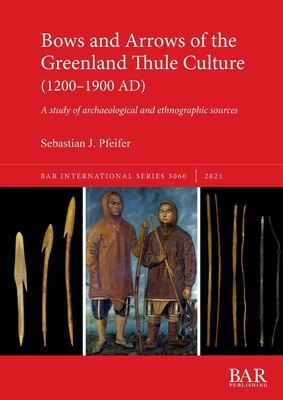
- We will send in 10–14 business days.
- Author: Sebastian J Pfeifer
- Publisher: British Archaeological Reports (Oxford) Ltd
- ISBN-10: 1407359029
- ISBN-13: 9781407359021
- Format: 21 x 29.7 x 0.8 cm, minkšti viršeliai
- Language: English
- SAVE -10% with code: EXTRA
Bows and Arrows of the Greenland Thule Culture (1200-1900 AD) (e-book) (used book) | bookbook.eu
Reviews
Description
This book presents the bows and arrows attributed to the Greenland Thule culture in the archaeological and ethnographic collections of the National Museum of Denmark. It contains a catalogue with comprehensive visual and metric data. Supplemented by material from other collections and written sources accessed through the literature, both regional variability and chronology are discussed. It becomes clear that during the spread and development of the Thule culture, its archery tradition developed into very different regional forms. This process was mainly triggered by resource availability and intra-group communication, or lack thereof. The second focus of the book is on functional analysis and examines the influence of raw material, technology and design on the performance of different bow and arrow types. It becomes clear that archery in Greenland, as in other Arctic regions, was highly complex and reflects specific environments of use. This makes it a primary source for Arctic cultural history.
EXTRA 10 % discount with code: EXTRA
The promotion ends in 23d.13:47:23
The discount code is valid when purchasing from 10 €. Discounts do not stack.
- Author: Sebastian J Pfeifer
- Publisher: British Archaeological Reports (Oxford) Ltd
- ISBN-10: 1407359029
- ISBN-13: 9781407359021
- Format: 21 x 29.7 x 0.8 cm, minkšti viršeliai
- Language: English English
This book presents the bows and arrows attributed to the Greenland Thule culture in the archaeological and ethnographic collections of the National Museum of Denmark. It contains a catalogue with comprehensive visual and metric data. Supplemented by material from other collections and written sources accessed through the literature, both regional variability and chronology are discussed. It becomes clear that during the spread and development of the Thule culture, its archery tradition developed into very different regional forms. This process was mainly triggered by resource availability and intra-group communication, or lack thereof. The second focus of the book is on functional analysis and examines the influence of raw material, technology and design on the performance of different bow and arrow types. It becomes clear that archery in Greenland, as in other Arctic regions, was highly complex and reflects specific environments of use. This makes it a primary source for Arctic cultural history.


Reviews